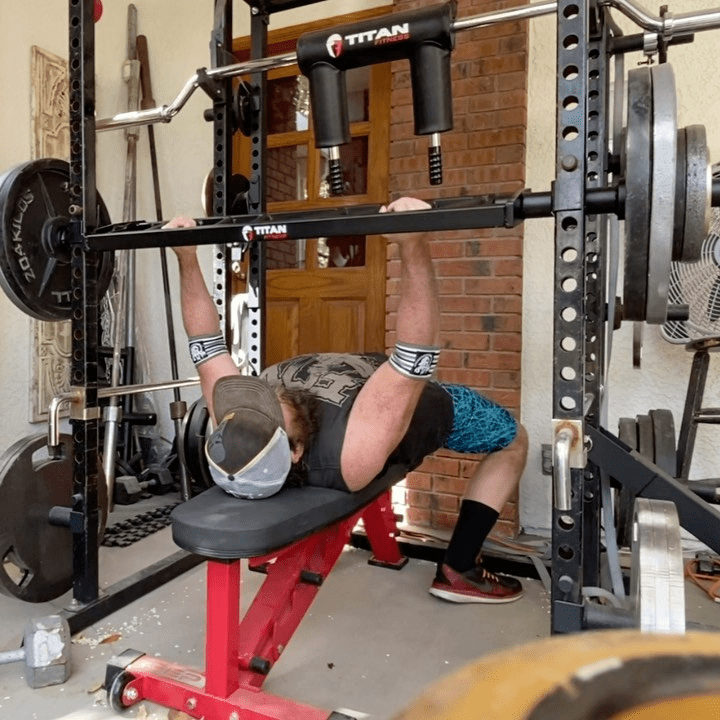The football bar bench press is one of the most underutilized bench press variations that will explode your strength and muscle gains.

The swiss or football bar is a unique bar that removes some of the stress on your shoulders and wrist while increasing tricep activation. Athletes have used this bar for years and it is great that it is finally making its way into home gyms.
In this guide, we will break down the benefits of the football bar bench and give you a step-by-step guide on how to do this new exercise correctly.
Table of contents
What Is A Swiss Bar?

The football bar(also known as the swiss bar or multi-grip bar) is a type of specialty bar that has a series of neutral grip options within the bar.
Traditionally, the swiss bar has been heavily associated with the swiss bar bench press even though it can be used for a number of other exercises as well (rows, overhead press, curls, incline press). The neutral grips of the bar make it easier to stack your wrists over your elbows, minimizing wrist pain. With the neutral grip, the elbows also naturally tuck in and put your shoulders in a less vulnerable position.
Why You Should Be Bench Pressing
I know that it has become popular in recent years to bash on the bench press because it is not “optimal” or is too “risky” but the reality is that the bench press is one of the most time-tested upper body exercises. There is even a direct correlation between bench strength and overall pec size.

That being said, I can understand why some have trouble with this lift. For one, it can be hard on your shoulders. I am sure I am not the only one who has felt some shoulder pain during a bench press session. Also, once you get past the novice/intermediate stage it can be very hard to progress consistently.
Whichever camp you fall into, the football bar can help bring some life back into your benching. Many people have found that the bar minimized their shoulder pain while others found that the football bar was enough to help them get through a plateau.
Benefits Of The Football Bar Bench Press
If you are one of those people that suffer from shoulder pain or are simply looking for another great exercise for your chest, the football bar bench press has a number of amazing benefits:
Saves Your Shoulders
When you are performing the bench, press you want to be sure to retract your shoulders and engage your upper back to provide a good base for pressing. Thanks to the neutral grip, you can more easily retract your scapula to protect your shoulders.
Furthermore, the neutral grip will force your elbows to tuck limiting elbow flair which is often associated with shoulder pain.

Wrists Are Secured
One of the most common technical mistakes during the bench press is allowing the wrists to collapse backward. Not only will this make it harder to lift the weight but it can also lead to wrist pain over time.
With a swiss bar, your wrists are locked into position and stacked directly over the elbows during the lift. This stable position minimizes the risk of a wrist injury even during more wrist-heavy variations like close-grip bench presses.

Targets Chest Pain-Free
As we have already established, the bench press works your chest like no other exercise really can. Considering how crucial the chest is for having an aesthetic, strong chest, targeting your chest with some kind of flat press is a necessity.
Stronger Triceps
Since your elbows will be tucked in close to your body during the movement, your triceps are going to be more heavily engaged. Use of the swiss bar can therefore lead to stronger triceps and better lockout strength across all pressing motions.
More Variation
With enough time, anyone will experience a plateau on the straight bar bench press. With a swiss bar, you get another variation that you can add to your rotation so that you avoid stalls in progress.
The slight change in form and muscle recruitment provided by the swiss bar is enough to stimulate new muscle growth and help you push through plateaus.
Inexpensive
Compared to other specialty bars, the swiss bar is fairly cheap. You can easily pick one up for under $200 from a quality brand. Given how versatile these bars are, I consider them no-brainers for home gyms.
How To Do The Swiss Bar Bench Press
Video Guide
Football Bar Bench Press Step-By-Step Guide
How To Do Swiss Bar Bench Press
Set up the bench and bar
The bar should be just above your forehead when you lay on the bench.
Get into a bench position
Grip the swiss at around shoulder width. Retract your scapula and engage your upper back.
Unrack the bar and lower the weight
Unrack the bar and slowly lower it towards your chest. The bar should be flat on your chest. Do not allow it to tilt or lose balance.
Push the bar up
Drive the bar up, it may help to imagine that you are punching the bar up
The exercise may feel foreign or weird at first, but that is normal. As you get more reps, you will better develop the form and mind-muscle connection.
Swiss Bar vs Straight Bar Bench Press
There are a few key differences between the swiss and straight bar variations:
You Will Be Weaker With A Swiss Bar
Do not expect to lift as much with a swiss bar as you can with a regular barbell. This is because more of the load is taken off your pec and shoulder and placed on the tricep. Your tricep will not be able to produce the same amount of force so you will lift less.
This is not really a bad thing as it allows you to get more out of less weight. As long as you are training hard, you should still see upper chest gains and direct strength carryover to straight bar presses.
You should also be aware that depending on the swiss bar you use, the bar can weigh more or less than a regular barbell.
More Tricep Activation
As we have already discussed, the tucked elbows mean that more of the weight is placed on your triceps. This is exactly what you want if you are trying to address muscular imbalances or improve lockout strength.

No Knurling
Most football bars will not have any knurling on the grips. Since these swiss bars were developed primarily for pressing, it makes sense. Knurling is usually used to help with grip on deadlifts or rows.
The lack of knurling can feel weird at first, but it should not really impact your grip.
Less Pain
For the vast majority of people, the swiss bar will provide some relief if they suffer from wrist or shoulder pain.
Why Not Just Use Dumbbells?
Another common solution provided to those that cannot do the straight barbell bench press is to simply switch over to dumbbells. For many people, I think that this is good advice as dumbbells provide many of the same benefits as the swiss bar. With dumbbells, you can control the path of the weight so you can keep your elbows tucked while minimizing stress on the shoulders.

If you have access to both, I think both the swiss bar and dumbbells variation of the bench press are great variations. However, I still the swiss bar is useful for the following reasons:
Most Home Gym Owners Do Not Have Dumbbells
A full dumbbell set can be very expensive. Most home gym owners do not have the space or budget to get dumbbells. Meanwhile, most already have a squat rack, bench, and weight plates. Since swiss bars are relatively inexpensive, they can get all of the same benefits for much cheaper.
Total Weight Overload
If you want to go really heavy, the swiss bar is superior to dumbbells. Dumbbells require more stabilization and will simply not allow you to lift as heavy as you can with a swiss bar.
Final Thoughts
If you cannot do the regular barbell bench press without pain, the swiss bar variation is a great solution. Thanks to the neutral grips, your shoulders and wrists will be in a much more stable position allowing you to build a shelf of a chest while staying injury free.

Find The Best Swiss Bar
After weeks of testing, we have compiled a list of the best swiss multi-grip bars on the market
FAQs
Is benching with a Swiss bar harder?
Yes, you can expect to lift less with the swiss bar. This is because more of the load is transferred to your triceps which are not as strong as your pecs and shoulders.
What muscles do the Swiss bar work?
When pressing with a swiss bar, you can expect to work the same muscles as a regular barbell: pecs, shoulders, and triceps. The difference is that the swiss bar will place more of the load on the triceps.
What are Swiss bars good for?
Swiss bars are great for helping you press with less pressure on your shoulders or simply adding another variation to your routine.
Michael Kirkland, is a trusted fitness expert and founder of FitDominium. With his extensive experience and commitment to helping others, Michael is the go-to source for reliable fitness advice and recommendations.
